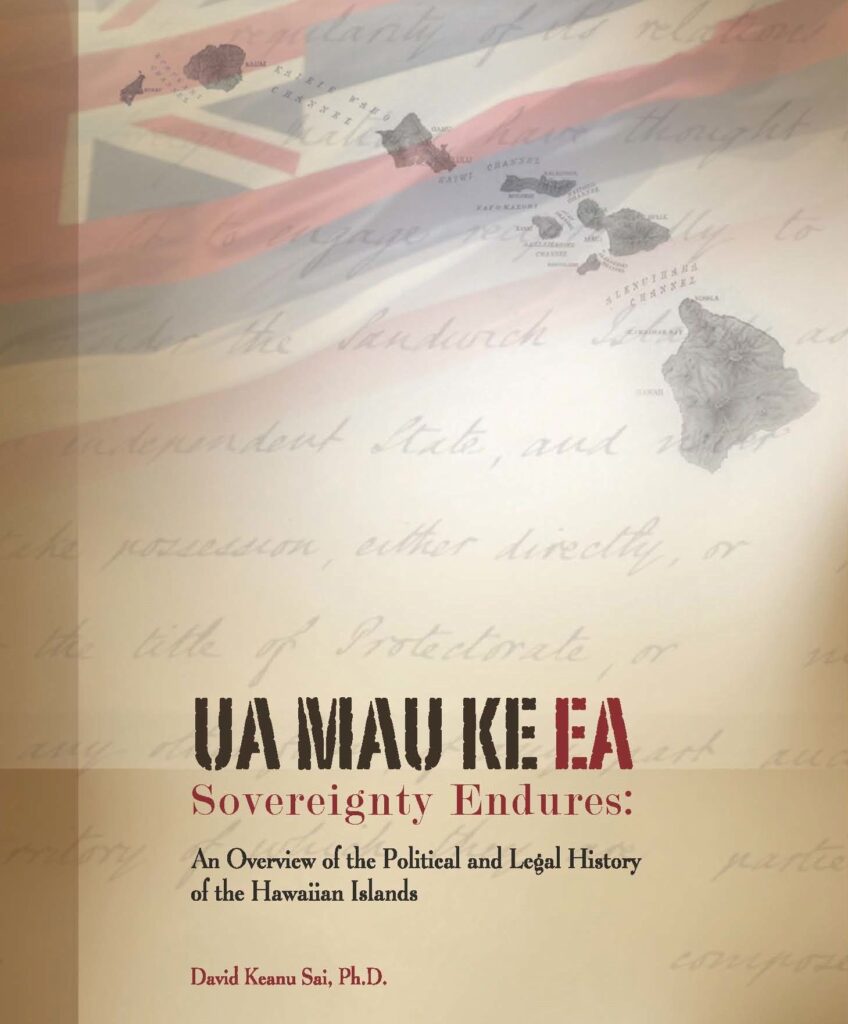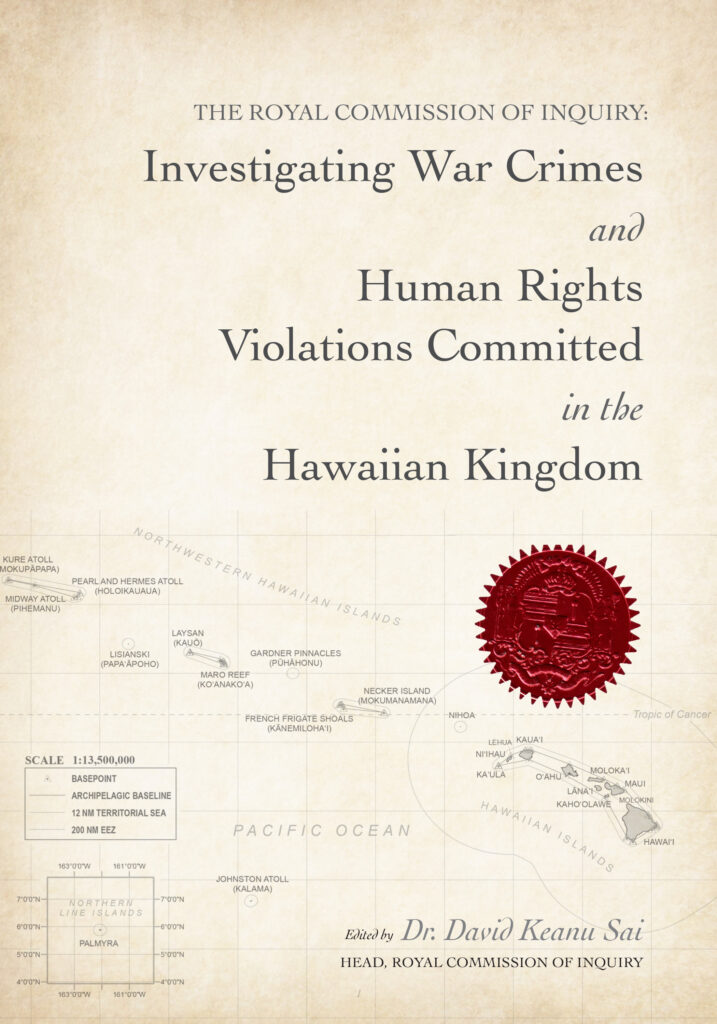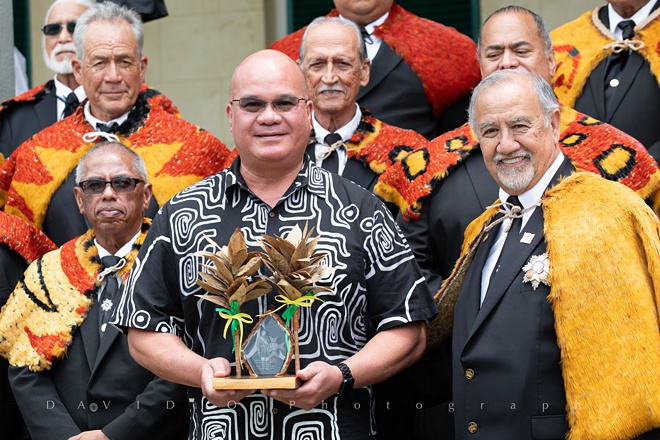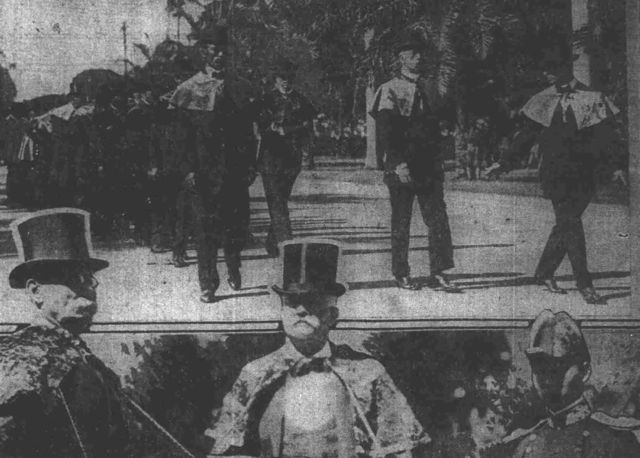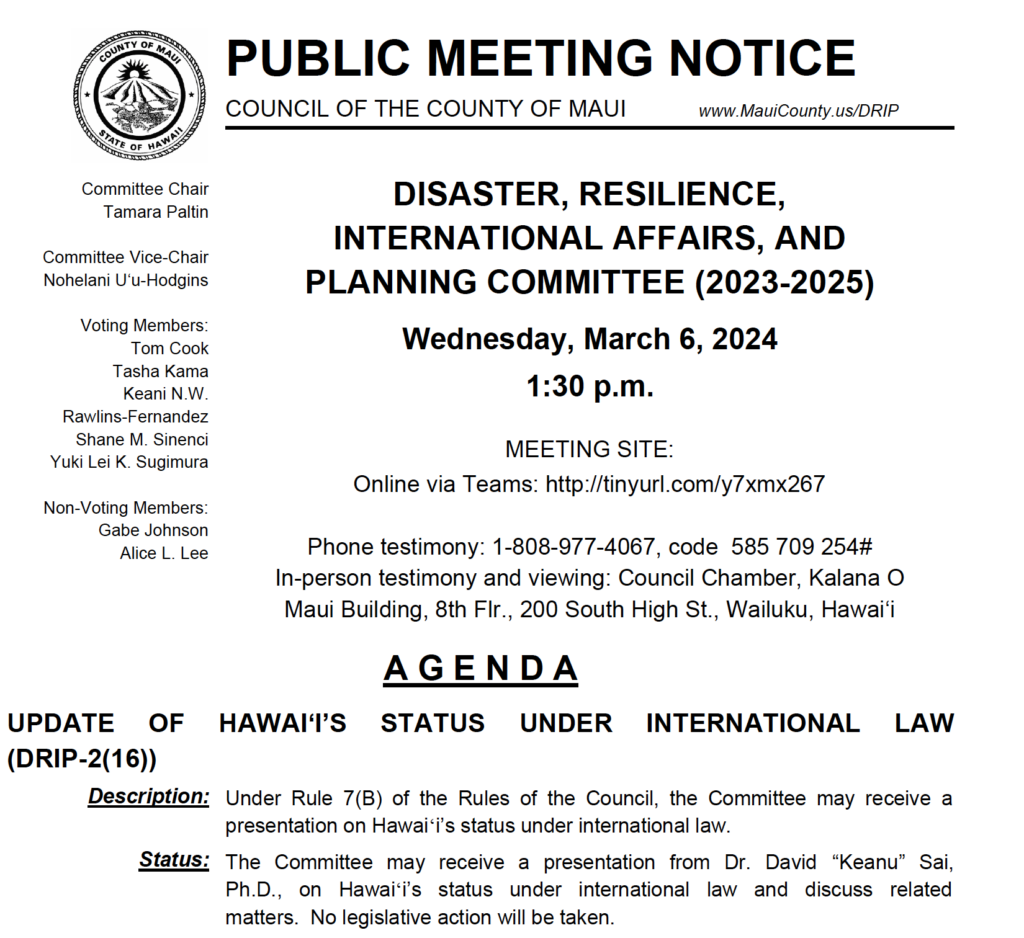As the country is moving ever so close to compliance with the law of occupation by the State of Hawai‘i, misinformation and disinformation must be addressed. It is understandable for the population of an occupied State not to fully grasp the situation of the Hawaiian Kingdom that it not only still exists as a country under international law but that it has been under a prolonged occupation for 131 years.
The reason why this occupation has lasted so long is because of denationalization through Americanization that formally began as a policy in 1906. Within three generations, the national consciousness of the Hawaiian Kingdom in the minds of its national population was erased. Replacing Hawaiian national consciousness with American national consciousness, together with its political ideologies and beliefs.
The recovery of Hawaiian national consciousness relies on accurate information through education. Just as education in the public and private schools, in the early twentieth century, was weaponized to erase Hawaiian national consciousness in the minds of school children, education today must be utilized, not weaponized, to restore it. It is a process, and, sometimes, an unpleasant process. This process of restoring Hawaiian national consciousness reveals the untruths and deceptions that were used to conceal an international travesty.
Many Hawaiian subjects served in the American military, whether voluntarily or by conscription, and it is naturally difficult to come to terms with this information. This difficulty to come to terms also applies to the entire population of Hawai‘i who were taught in school and were led to believe that Hawai‘i is a part of the United States and that they are American citizens.
The clashing of two sets of beliefs is called cognitive dissonance, which “is a psychological phenomenon that occurs when a person holds two contradictory beliefs at the same time.” The two beliefs that collide is Hawai‘i the 50th State of the American Union and the Hawaiian Kingdom as an occupied State since 1893. Both beliefs are mutually exclusive, which means that both cannot exist at the same time. The continued existence of the Hawaiian Kingdom as an occupied State cancels the existence of the State of Hawai‘i and the federal government. As the Permanent Court of International Justice, in the S.S. Lotus case, stated in its 1927 judgment:
Now the first and foremost restriction imposed by international law upon a State is that—failing the existence of a permissive rule to the contrary—it may not exercise its power in any form in the territory of another State. In this sense jurisdiction is certainly territorial; it cannot be exercised by a State outside its territory except by virtue of a permissive rule derived from international custom or from a convention (treaty).
Since 1893, the United States has been exercising its authority over Hawaiian Kingdom territory without any ‘permissive rule derived from international custom or from a convention (treaty).’ If the United States, to include the State of Hawai‘i, has no lawful authority to exercise its power in Hawaiian territory, then everything that derives from its unlawful authority is invalid in the eyes of international law. This comes from the rule of international law ex injuria jus non oritur, which is Latin for “law (or right) does not arise from injustice.”
From this international rule—ex injuria jus non oritur, when applied to an occupied State, springs forth another rule of international law called postliminium, where all unlawful acts that an Occupying State may have been done in occupied territory are invalid and cannot be enforced when the occupation comes to an end. According to Professor Oppenheim, “If the occupant has performed acts which are not legitimate acts [allowable under the law of occupation], postliminium makes their invalidity apparent.”
Cognitive dissonance occurs when a person cannot let go of their former beliefs and tries to incorporate these beliefs into the new belief. This approach reveals contradictions, which is analogous to asserting baseball rules into a football game. It is either a football game or a baseball game. The football game is the American occupation of the Hawaiian Kingdom. The baseball game is Hawai‘i being the 50th State of the American Union. International laws are the rules of the football game, and American laws are the rules of the baseball game.
Within the United States, there is a Sovereign citizen movement that believe “the Uniform Commercial Code, which provides an interstate standard for such things as property ownership or bank accounts (and documents that they believe apply only to their strawman, such as drivers’ licenses, is a codification of the illegitimate commercial law ruling the United States.” Many groups of the Hawaiian sovereignty movement subscribe to this belief that sees the State of Hawai‘i as a corporation with no authority over free and sovereign citizens. Whether you agree or disagree with the Sovereign citizen movement, it has no place in the Hawaiian Kingdom being an occupied State that has suffered the devastating effects of the war crime of denationalization. To claim to be a sovereign citizen in a country that is a constitutional monarchy is a contradiction. You cannot have a monarchical system of governance when some of its people claim to be sovereign themselves.
The Uniform Commercial Code (UCC) was first published in 1952 as a joint project of the Uniform Law Commission, which is also called the National Conference of Commissioners on Uniform State Laws, and the American Law Institute. Its goal was to harmonize State law because commercial transactions extend beyond one State’s jurisdiction within the United States. Another goal of the UCC was to modernize contract law.
Having come from two private organizations, the UCC is not American law until the States and Territories of the United States adopt it. Forty-nine States, which includes the State Hawai‘i, as well as the District of Columbia, Guam, the Northern Mariana Islands, and the U.S. Virgin Islands have adopted the UCC as their law with minimal changes. According to the website of the Uniform Law Commission, the “Uniform Commercial Code…is a comprehensive set of laws governing all commercial transactions in the United States. It is not a federal law, but a uniformly adopted state law.” As such, the UCC is an American law limited within the territorial jurisdictions of the forty-eight States of the American Union and three of its territories that adopted it.
The political economy of the United States and its UCC is not the political economy of the Hawaiian Kingdom prior to the American invasion in 1893. Political economy is the economic system and its governance by the political system of a State. The Hawaiian Kingdom was a progressive country when compared to the European States and their successor States on the American continent in the nineteenth century. Its political economy was not based on Adam Smith’s capitalism—Wealth of Nations, but rather Francis Wayland’s approach of a cooperative capitalism. According to Professor Mykkanen, Wayland was interested in “defining the limits of government by developing a theory of contractual enactment of political society, which would be morally and logically binding and acceptable to all its members.”
Wayland’s book, Elements of Political Economy, was the fundamental basis when written in the Hawaiian language and adjusted to apply to Hawaiian society accordingly by William Richards. The book was titled No Ke Kālai‘āina (English translation), which theorized governance from a foundation of Natural Rights within a Hawaiian agrarian society based upon capitalism that was not only cooperative in nature, but also morally grounded in Christian values. Contemporary historians and academics mistakenly assumed that American capitalism was the political economy of the Hawaiian Kingdom. Along with the unlawful imposition of American municipal laws after 1898, was the unlawful imposition of the American version of capitalism. Karl Marx, the renowned critical theorist, would have found the Hawaiian Kingdom’s political economy very appealing.
The Hawaiian Kingdom was the only country to adopt Wayland’s theory of economics. The United States and the United Kingdom based their economies on Smith’s theory of capitalism. Wayland’s form of capitalism was taught in the schools throughout the islands and framed political and economic discourse in the country. It also set in motion Hawai‘i’s mixed economy and the seed was planted for the Hawaiian Kingdom to become the first welfare State that would predate the Nordic countries by a century.
The welfare State is a “concept of government in which the state or a well-established network of social institutions plays a key role in the protection and promotion of the economic and social well-being of [its] citizens.” German Chancellor Otto von Bismark is credited with establishing the idea of a welfare State, and the Hawaiian Legislative Assembly would cite him regarding economic legislation and reform for the Kingdom. He was referred to as “Bisimaka,” which is Hawaiian for “Bismark.”
During military occupations of occupied States, the occupying State is only allowed limited authority to exercise its power by virtue the permissive rule under Article 43 of the 1907 Hague Regulations. Article 43 provides that once the occupying State has effective control of the territory of an occupied State, it is obligated to establish a military government in order to administer the laws of the occupied State. In other words, the United States should have established a military government on January 17, 1893, to administer temporarily administer Hawaiian Kingdom law after Queen Lili‘uokalani conditionally surrendered, and up until there is a treaty of peace between the United States and the Hawaiian Kingdom.
According to Professor Benvenisti, the “public order and civil life are maintained through laws, regulations, court decisions, administrative guidelines, and even customs, all of which form an intricate and balanced system.” This description reflects the legal order of a State, where sovereignty is the authority exercised by the government of the State in maintaining the ‘public order and civil live.’
For the Hawaiian Kingdom, the legal order is framed by the 1864 Constitution, as amended, which provides for the ‘laws, regulations, court decisions, administrative guidelines, and even customs’ to exist. The legal order of the occupied State includes the Hawaiian Kingdom’s political economy. The Hawaiian Kingdom’s legal order is explained in Chapter 1—Hawaiian Constitutional Governance (p. 59-94) in the ebook Royal Commission of Inquiry: Investigating War Crimes and Human Rights Violations Committed in the Hawaiian Kingdom. U.S. Army Field Manual 27-10. Section 358 titled Occupation Does Not Transfer Sovereignty states:
Being an incident of war, military occupation confers upon the invading force the means of exercising control for the period of occupation. It does not transfer the sovereignty to the occupant, but simply the authority or power to exercise some of the rights of sovereignty. The exercise of these rights from the established power of the occupant and from the necessity of maintaining law and order, indispensable both to the inhabitants and to the occupying force. It is therefore unlawful for a belligerent to annex occupied territory or to create a new State therein while [the occupation is] still in progress.
Since January 17, 1893, the United States was unlawfully exercising its power over the Hawaiian Islands and the population by maintaining its puppet governments calling themselves the provisional government and then the so-called Republic of Hawai‘i, and its unlawful imposition of American laws when it unlawfully annexed the Hawaiian Islands in 1898, and then unlawfully created the American State of Hawai‘i in 1959. The very existence of the Hawaiian Kingdom as an occupied State cancels any and all American authority in the territory of the Hawaiian Kingdom unless that authority is in line with the 1907 Hague Regulations and 1949 Fourth Geneva Convention, which it is currently not.
Considering the severity of the situation, the Council of Regency’s approach toward compliance by the State of Hawai‘i is laser focused on the duties and responsibilities of State of Hawai‘i Major General Kenneth Hara to transform the State of Hawai‘i into a Military Government. The Council of Regency did not choose MG Hara to perform this duty, but rather the rules of international law did because he is the highest ranking general officer in the State of Hawai‘i Department of Defense.
The Hawaiian Kingdom is at the cusp of a radical change in governance that is in line with international law. A change that must bring 131 years of violating international law in line with Hawaiian Kingdom law. As education was once weaponized for illicit purposes, it is crucial at this time to facilitate compliance with the law through accurate information and responsible education.

